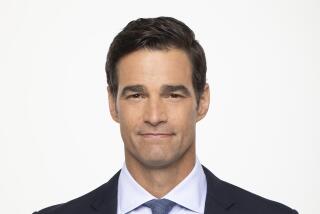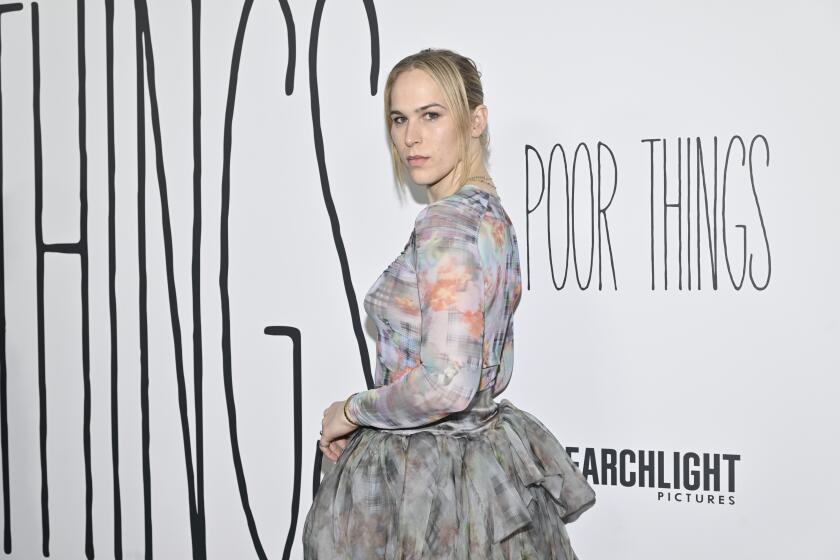Documentaries are Sundance’s real strength
It’s nobody’s fault, really it isn’t, but there’s a gap between the way the just-concluded Sundance Film Festival is written about in news reports and the way I experienced it as a critic on the ground, a gap that seemed especially large this year.
Because news coverage inevitably focuses on the festival’s numerous winners and because Sundance’s dramatic competition is its highest-profile section, who won what where is what gets highlighted. That, and what films got picked up for eventual distribution in theaters and elsewhere.
It’s not that I’m an enemy of the business aspects of Sundance, far from it. In fact, the most off-putting aspect of this year’s event was the festival’s insistent “aren’t we hip” advertising campaign that pushed self-congratulatory slogans like “This Is the Renewed Rebellion.” Any festival that showcases the deliriously commercial Kristen Stewart-starring “The Runaways” ought to think twice before hyping itself as “the Rebirth of the Battle for Brave New Ideas.”
As it turned out, this year’s big dramatic winner was an especially satisfying choice: Debra Granik’s “Winter’s Bone,” which won both the grand jury prize and the Waldo Salt screenwriting nod. Set in the clannish, impoverished mountain communities of Missouri’s Ozarks, this intensely atmospheric tale follows a teenage girl’s bleak and desperate quest for her father.
Though it didn’t win a thing, one of the most impressive of the competition’s dramas was Tanya Hamilton’s “Night Catches Us.” Set in 1976 in a Philadelphia neighborhood that’s still feeling the effects of a Black Panther movement now past its prime, this rich and satisfyingly multi-character drama about the intersection of the personal and the political also showcases wonderful performances by stars Anthony Mackie and Kerry Washington.
All that notwithstanding, it’s an open secret among Sundance veterans that the dramatic competition is not the best place to be going in Park City if you want a satisfying movie experience. Combine the relative youth and inexperience of the competition directors with the festival’s fanatical determination to keep that section free of commercial taint and you frequently get films where aspirations outweigh execution.
A better bet each year, because the directors often have more features in their résumés and the programmers have a wider pool to select from, are the foreign films. While the bigger titles like France’s “A Prophet” and Australia’s “Animal Kingdom” (which deservedly won the world dramatic jury prize) performed as expected, even some of the smaller pictures were a tonic to experience.
Worth a second look are Argentina’s elegantly corrosive “The Man Next Door” (which took the world drama cinematography award), India’s satiric “Peepli Live” and even Australia’s infectious “Bran Nue Dae,” the equivalent of a Bollywood musical set in the Outback.
Though not the prime focus of media attention, the best things in Park City were the festival’s horde of documentaries, always a Sundance strength but better than ever this year, and at 40-strong, so wide-ranging in subject matter and style that seeing a chunk of them was like getting an advanced degree in the ways of the world. If there is a better place to experience the documentary form, it doesn’t come to mind.
If you immersed yourself in documentaries, as I unapologetically did, you could also get the un-looked-for pleasure of having these films dialoguing with each other, offering perspectives in combination that enhance what they offer on their own. For example:
* “Restrepo” (winner of the documentary grand jury prize) and “The Tillman Story.” It was seriously chilling to realize that the passion for firing weapons at slight provocation -- exhibited by “Restrepo’s” Afghanistan-based Army platoon -- was exactly the phenomenon that had gotten former-NFL-star-turned-soldier Pat Tillman killed by friendly fire four years earlier.
* “Waiting for Superman” and “Last Train Home.” This pair found common ground in the depiction of the painful lengths parents will go to assure the best for their children. Davis Guggenheim’s “Superman,” winner of the documentary audience award, reveals the interlocking factors that have created a crisis in public education so severe it might take a superhero to resolve it, while “Last Train Home,” directed by Lixin Fan, takes us with heart-rending intimacy into a family riven by conflict over their daughter’s future education.
* “Exit Through the Gift Shop” and “Jean-Michel Basquiat: The Radiant Child.” Two disquieting examinations of the murky waters of the contemporary art scene. “Gift Shop,” directed by the gifted provocateur Banksy, is an unexpectedly twisty and provocative commentary on the commercialization of art. The Basquiat film is a moving examination of a life cut short at 27, a haunting look, graced by interview footage director Tamara Davis shot more than 20 years ago, at an artist who craved fame but found himself without the tools to navigate its crushing demands.
* “A Film Unfinished” and “Freedom Riders.” The varieties of prejudice unite these two. Yael Hershonski’s “Unfinished” (which won the world documentary editing award) is a deeply disturbing film about a deceptive Nazi attempt to film the horrors of the Warsaw Ghetto. Stanley Nelson’s “Freedom Riders,” with its phenomenal stories of the purity of belief of young civil rights protesters, makes you wonder where fearless idealism in this country has gone. To see these films back to back, as I did, was a frankly devastating experience.
* “Life 2.0” and “Casino Jack and the United States of Money.” Two films that take us to strange, unreal worlds. “Life,” courtesy of director Jason Spingarn-Koff, brings you inside the head-spinning virtual universe that is Second Life. By contrast, as presented in compelling detail by Alex Gibney, the Washington, D.C., world of disgraced lobbyist Jack Abramoff, who was the best there was at delivering money to power, is, sad to say, all too real.
Clearly, if you missed the documentaries in Sundance, you missed a lot. But don’t worry. As we used to say in Brooklyn, wait till next year. They’ll be just as good. Guaranteed.
More to Read
The biggest entertainment stories
Get our big stories about Hollywood, film, television, music, arts, culture and more right in your inbox as soon as they publish.
You may occasionally receive promotional content from the Los Angeles Times.







